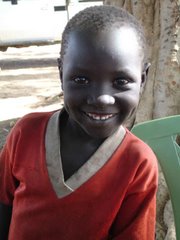Eighth Sunday of Ordinary Time
Marie Dennis
March 2, 2014
Isaiah 49:14-15; Psalms 62:2-3, 6-7, 8-9; First Corinthians 4:1-5; Matthew 6:24-34
After decades of civil war, people in the newly independent country of South Sudan had begun to return to their villages, to rebuild their lives and to think about the future. Then, chaos returned as fighting again broke out as political differences descended toward civil war.
“Therefore I tell you, do not worry about your life, what you will eat or drink, or about your body, what you will wear. Is not life more than food and the body more than clothing?” Matthew 6:25
What could this admonition possibly mean to the people of Bor or Nimule or Malakal or other South Sudanese communities in the midst of the violence, when food security, access to water, land for grazing cattle or for farming, health care, basic education – even passable roads – were far from certain? Perhaps it made more sense to them than to those of us who thought security rested on financial prowess, a “successful” career or many possessions and were bitterly disappointed to learn that “having more” did not necessarily guarantee security when serious illness or unemployment hit close to home. Western civilization’s post-Enlightenment emphasis on individualism and post-industrial revolution emphasis on material “progress” without concern for the common good or the survival of the planet has left us more vulnerable than secure. The size of the U.S. military budget makes that very clear.
For generations, the Sudanese and many African peoples have known that genuine security is nurtured in community. Perhaps the most devastating consequences of prolonged war in Sudan – and of this most recent violence as well – are the displacement of communities with the deep challenge that presents to sustained security and the proliferation of small arms in local communities with the false sense of security they offer.
In Bor and Nimule and Malakal and in many other corners of the new South Sudan, people had reclaimed life with hope and enormous creativity. As they began the long, challenging task of building a nation – even without the added challenge of the recent violence – they faced many important decisions about the future direction of their society. Would the development of South Sudan be shaped by external forces lusting for land and oil, profits and new “markets”? Would they be forced into an individualistic definition of “development” or would they focus instead on the common good? Would they sustain right relationships with the natural world, with the corner of Mother Earth where they live, or would they adopt an economic model that is unsustainable? Would they find ways to rebuild security in local communities? Would they rid themselves of the curse of small arms?
The gospel, “You cannot serve God and wealth,” and Catholic social (and environmental) teaching’s measures of a moral economy can help us all imagine a future that is both sustainable and secure. In such a future, the global common good, vibrant local communities and a good quality of life for all will take precedence over the accumulation of wealth and possessions by individuals or individual nations; diversity will be honored and protected; and weapons will be replaced by dialogue and diplomacy as a tool for resolving international and intercommunity conflicts.
We live in a world that is intrinsically interconnected. How people living in consumer societies move into the future and how the people of South Sudan move into the future are “of a piece.” The international community can thrust South Sudan into the “real” world of competition for oil and land and water and markets or we can accompany South Sudan respectfully on their own journey toward lasting peace and sustainability. If the ultimate goal is “more” for us, we will use every tool in the foreign policy toolkit (foreign aid, diplomacy, military might, economic persuasion…) to help South Sudan open itself to western ideas and investment. If the ultimate goal is inclusive global security, we will listen with great care and help where we can as South Sudan cares for its own people and becomes the positive force in the Horn of Africa that its rich experience and diverse cultures have prepared it to become.

